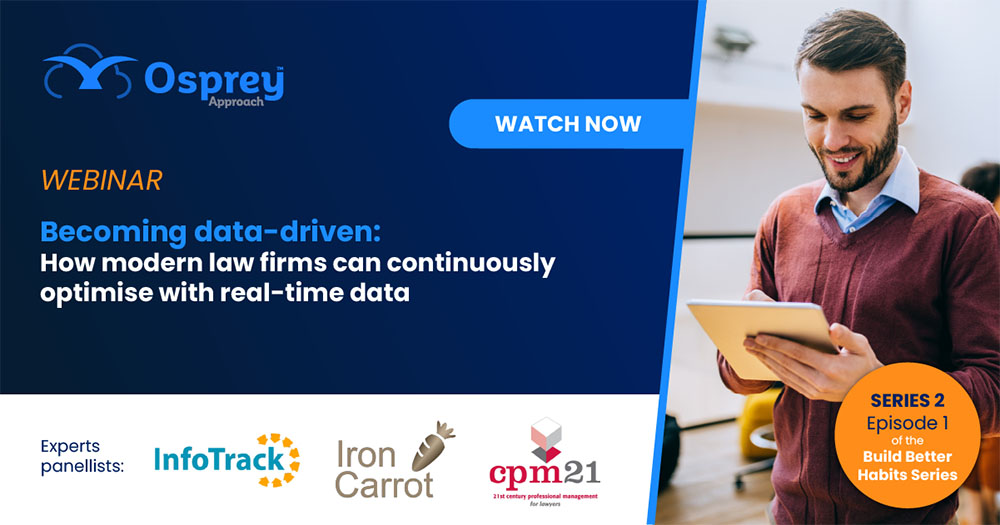Our COO, Sam Jordan shared practical tips and advice on how SME law firms can become more data-driven – and the long-term benefits of doing so.
How modern SME law firms can become more data-driven in decision-making
It was my pleasure to take part in the first episode of Osprey Approach’s second series of webinars, which are designed to help modern law firms Build Better Habits. I joined CJ Anderson, director at Iron Carrot, and Ian Hopkins, senior consultant at CPM21 on the panel with host and Osprey’s marketing manager, Amy Bruce.
We shared our practical tips and advice on how SME law firms can become more data-driven – and the long term benefits of doing so.
What does it mean to be a data-driven law firm?
According to the 2023 LPM Frontiers report, becoming more data-driven in decision making is one of the top three strategic priorities for SMEs over the next 12 months. The panel agreed that, at a basic level, being data-driven enables legal teams to make more informed decisions. Crucially, though, it’s about changing the firm’s culture and adopting a different mindset.
Both Ian and I highlighted that whilst data removes an element of emotional decision making, intuition is still key in getting the most from the data. Ian explained, “Utilising data doesn’t mean people should abandon intuition. In fact, the ability to interpret data using common sense is arguably as important as the data itself.” It’s true that we make decisions emotionally, but being data-driven means those decisions can be backed up by data for better outcomes.
Becoming a data-driven law firm is a long-term project, not something that will happen overnight. Ian explained how he sees utilising data in two steps: “Step one is about moving people away from making decisions based solely on gut instincts. I believe most firms are in that stage. Then, once established, you can push on and develop into a true data-driven business.”
CJ agreed and commented that “cultural change is a long-term project, but there are things to do in the interim to move to being data-enabled. Being data-enabled is about using data to help and support plans.”
Why should becoming a data-driven firm be a priority for all modern practices?
Becoming more data-driven doesn’t just impact your firm’s financial performance; it also impacts client service and empowers employees, given its impact on productivity and efficiency in your day-to-day working.
Perhaps the ultimate value of being data driven is how it can create a competitive advantage for your firm. Data should be used to make decisions that will open up new opportunities. Whether that’s deciding on new innovations or what you should no longer focus on, the data should have genuine impact on your business.
Seven data-driven habits law firms should adopt
The panel agreed that modern law firms should focus on the following habits to become a more data-driven firm:
1. Decide what is important to you
Start by aligning your data to your firm’s goals and objectives. CJ advised that firms “know which data is important to you and make sure everyone in the firm knows where to find it, how to input it, and how to get the data back out.”
2. Agree on the metrics
The metrics you track should be clear and uncomplicated. CJ recommended “agreeing on what the metrics are, what they mean, and how they’re going to be calculated. It sounds pedestrian, but it’s important all departments are calculating and analysing the data in the same way.”
3. Focus on collectivism
Data can only affect firm-wide goals and success if it’s well communicated and prioritised by all.
CJ advised to, “work out loud. So, share the data, its definitions and how to access it with everyone. Working out loud is about sharing; collectivism is a big part of being data-enabled.”
4. Communicate top-down
Firms need to be aware of the pitfalls of lawyers and other team members working in isolation if they want to become more data-driven. Ian added that “becoming a data-driven business requires a cultural shift, which is very difficult. Buy-in from the top is vital because clear leadership is an important element.”
5. Provide training
A successful data-driven culture requires effective utilisation of the data you collect. I advise that practices should ensure the data is accessible to everyone. People need to know how to input it and use it, which requires the right skill sets and, therefore, the right training.
6. Work in a measurable way
The goals you’re looking to achieve as a firm should be measurable in order to utilise the data. At InfoTrack, we work in a measurable way and focus on five priorities, every third, that we try to achieve. Those top five objectives flow throughout the company so each department and individual has measurable objectives that align with those top-level goals.
7. Ensure accessibility
Not only should employees have the right training to better utilise the data; it needs to be accessible to everyone. Ian added that “lawyers, in my experience, prefer visual presentations to rows of data in spreadsheets. The data, from an end user’s point of view, should be accessible using visual dashboards and graphs. This will help you paint a picture of the story you’re trying to tell.”
How does legal tech and digital tools effective a data-driven strategy?
Technology provides a centralised platform to input and utilise the data you store from across the firm. Without it, you’re left spending hours on paperwork and spreadsheets.
Law firms need the right tech in order to become truly data-driven. If you digitalise the whole process, bring the data together, and turn your processes into workflows then you can effectively use your data. That’s how you transform data and ensure it’s accessible to everyone.
Legal tech enables you to capture and store the metrics you need and then analyse and visual the insights. Your practice and case management software provides you with a single source of truth where you can find the data with confidence. Putting the data in one place means people can actually use it to do their job quicker.
Ian agreed and commented how tech empowers employees, which ultimately benefits the firm’s bottom-line. “Businesses with engaged staff perform better, so if you’re investing in tech and utilising data to improve people’s jobs it’ll improve engagement, which is a very positive thing for your business.”
An effective culture and the right legal tech is required to become a more data-driven law firm
Becoming more data-driven is rightly a strategic priority for many SME law firms because it sits at the heart of long-term success. Accessing and utilising data helps firms develop a competitive advantage and deliver a service that clients recommend and return to.
No matter the size of your firm, data holds the key for performing your best. Alongside ensuring you capture quality and accurate data, becoming a data-driven firm is all about your people. Building an effective culture and a confident team who can utilise data to their advantage is what will propel your business forward.
Access more exclusive advice and guidance from the panellists by watching the full episode now available on-demand.





